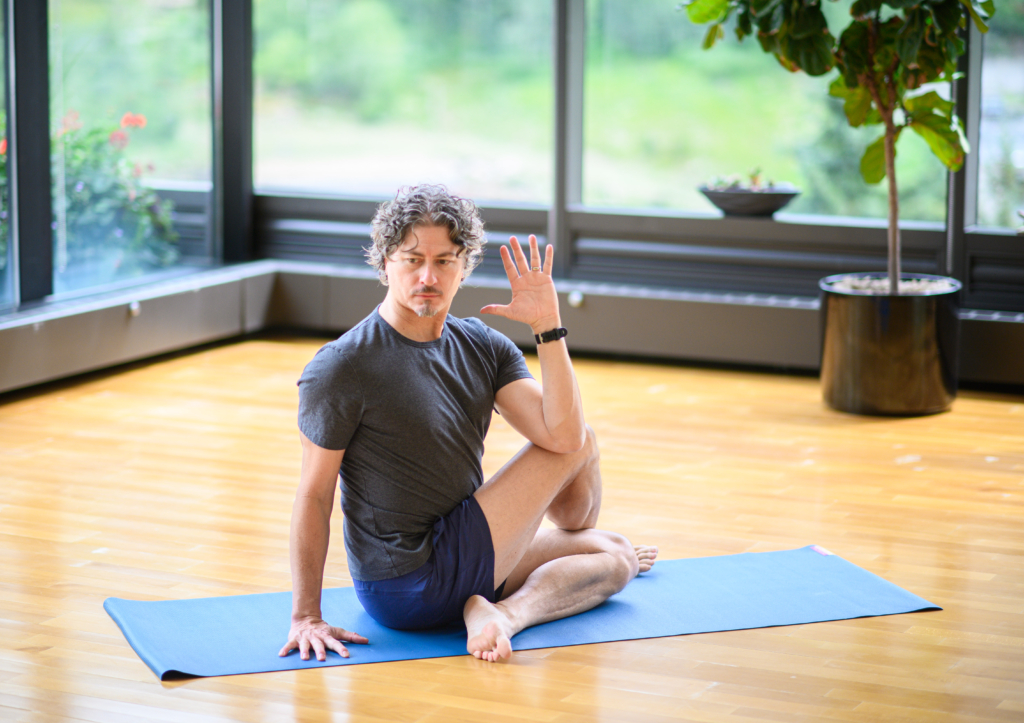
Take the title of this article as you will. Marichyasana (Marichi’s Pose) honors an ancient sage of yogic mythology. Marichi was the son of Brahma, the divine creator. His name literally means “ray of light” from the sun or moon in Sanskrit. However, not all of Marichi’s exploits could be deemed as light filled.
One day, upon returning from gathering wood in the forest, a tired Marichi called to his wife, Dharmavrata, to wash his feet. When Brahma unexpectedly entered their home, Dharmavrata was confused as to which of the gods should take precedence. Technically, it seemed that turning her attention to the divine creator might be the correct path, so that’s what she did. This incurred the wrath of her husband, who put a curse on her, turning her into a stone. Subsequently, Dharmavrata spent years in dedicated meditation practice to atone for her unforgivable faux pas. As a result, Lord Vishnu lifted the curse, only to have it reinstated by her still-angry husband. Oh well.
Fortunately, practicing Marichyasana doesn’t require that we either believe or follow the trajectory of this myth. Instead, we can enjoy the fruits of a simple spinal twist without the patriarchal baggage.
Why Practice Marichyasana?
There are several versions of Marichyasana. In fact, the website, Tummee, touts 62 versions, including variations in arm positions, chair versions and more. Here on the Hugger Mugger blog, I’ve previously written about what’s usually called Marichyasana III. Today’s version is quite similar to that one. The only difference is that the knee of the bottom leg is bent instead of straight, eliminating hamstring challenges.
There are many benefits to practicing spinal twists in general. Here are a few that come from general spinal twisting and some that are specific to Marichyasana:
- Stretches the spine and the back muscles.
- Increases the flexibility and strength of the spine and back muscles.
- Loosens shoulder muscles.
- Massages the internal organs and glands.
- May help to relieve fatigue.
As with all poses, there are cautions to practicing twists, including seated twists. Do not practice twists if you are in the first trimester of pregnancy. Also, take care in this pose if you have diagnosed disc disease, sacroiliac (SI) joint issues, or back problems in general.
How to Practice Marichyasana
- Gather your props: Yoga Mat, Yoga Block and Yoga Blanket. You may or may not need the block or blanket, but it’s nice to have them handy, just in case.
- Sit on your mat with your legs stretched out in front of you.
- Bend your right knee and step your right foot over your left leg, so that the sole of your foot rests on the floor.
- Now bend your left knee, placing your left heel next to your right hip.
- Check your spine. Are the vertebrae poking out in your lumbar spine? If so, place a folded blanket under your glutes to elevate your pelvis.
- Rotate your spine to the right, allowing your right hip to scoot back. Do not try to square your hips—in any twist. Practicing this very popular alignment trope while twisting can displace your sacroiliac (SI) joint. Instead, allow your right ischial tuberosity (sitting bone) to draw back.
- Place your right hand behind you on the floor. If you’re not able to touch the floor, or barely able to touch, place your block under your hand so that it makes solid contact. Then press down through your hand to help you lengthen your spine.
- Place your left elbow on the outside of your right knee. If you notice that your shoulders are hunching forward, release your elbow and place your left hand on the outside of the right knee instead. (The ratio between the length of the torso, length of the humerus bone and the length of the bones in our legs is different for each person. If your shoulders hunch forward when your elbow is on the outside of your knee, it’s not an indication of a lack of flexibility. It’s more likely that your humerus bone is on the shorter side and won’t reach your knee without your having to bend your shoulders forward.)
- Take 5 to 10 deep breaths here. If breathing is difficult, rotate out of the pose a bit. Breathing is more important than what your pose looks like.
- Return to the center, stretch your legs out and take a few breaths to tune into your body before switching to your second side.

